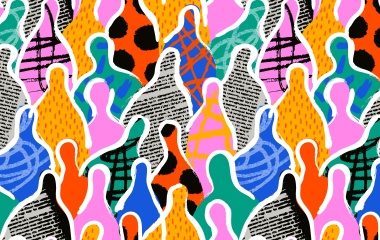
The first chapters of the book of Bamidbar focus on readying the people to enter the Land. The primary focus is on the physical aspects of entry; the census, the campgrounds, order of marching and the like. Unfortunately, the physical entry was to be delayed, and hence Sefer Devarim focuses once again on preparing the people - the children of those mentioned in Bamidbar - to enter the Land. The focus there is on spiritual matters, ethics, morality, just society and the like. A nation ultimately is only as strong as its core moral values.
After it finished enumerating the positions that each tribe was to take as they marched through the desert, the Torah lists those who may not march with the people: the leper, one with certain bodily secretions and the impure. The Torah then moves on to a series of mitzvoth; the Sotah (the women suspected of adultery), the Nazir (the person who desires to withdraw from society), the obligation of kohanim to bless the people daily. These are preceded by what is introduced as a major principle of Torah.
"A man or a woman who commits, mikol chatat Ha'adam, any wrong against their fellow man, thus being untrue to G-d and becoming guilty of a crime (Bamidbar 5:6)". While mikol could mean "from any" such adds little to our understanding of the verse, which would be perfectly clear even without the word mikol. Rather, in context mikol should be understood as "from all," equating this sin to all others. What is it that is equated to "all the sins of man" and is a trespass unto G-d? Might it be idolatry, lack of Shabbat observance, or failure to honour one's parents? Those are important, but that is not what the Torah is referring to. Instead it is a rather obscure law, that of the consequences of stealing from a convert.
The moral fabric of a society can be seen by how it treats its outsiders. Do we take advantage of the newfangled Jew, viewing him with suspicion and somehow suspecting him of not being a pure Jew? Or do we appreciate the tremendous difficulty in leaving one's natural community, and the devotion, diligence and dedication that each convert displays? It is easy to take advantage of the convert. Easy--and thus crucial that we do not do so. It is not by chance that the Talmud teaches that oppressing a convert places one in violation of up to 46 commands of the Torah (Bava Metzia 59b).
The law of stealing from a convert is not just the first law after describing the assembly of the desert camp. Treatment of the "outsider" is the measure of the strength of our camp. Returning stolen goods, however, is not enough. The Torah adds a further law, namely that the thief must confess his sin. While this law applies to theft from convert and non-convert alike (and a host of other laws), it is most instructive that this requirement of Viddui, generally associated with Yom Kippur, is derived from our treatment of the outsider. While in a technical sense ger in our context refers to a convert, the term ger in biblical Hebrew refers also to all "strangers", those who are outside of our normal interactions.
Admitting a wrong is most difficult and we are often witness to the great lengths people will go to justify wrongdoing, even if they are truly sincere, rather than entertain the possibility that they made a mistake. This is especially true when dealing with those whom we view as on a "lower level" than ourselves. Admitting that a subordinate is more correct than we may be is threatening to many. But to be blind to this reality makes us all poorer.
A community is greatly enriched and invigorated when outsiders join, bringing with them fresh ideas and new insights. If instead, we take advantage of these people, we are in need of self-examination. But we first have to admit that our ways need mending.
Interestingly, there is a third place where viddui is required, known as viddui ma'aser. The farmer must declare that the correct tithes have been given to our religious leaders and the poor (they are not meant to be the same). To publicly declare something helps one to act accordingly; to do otherwise can turn one into a hypocrite. And our actions must begin with helping the most vulnerable in society.



